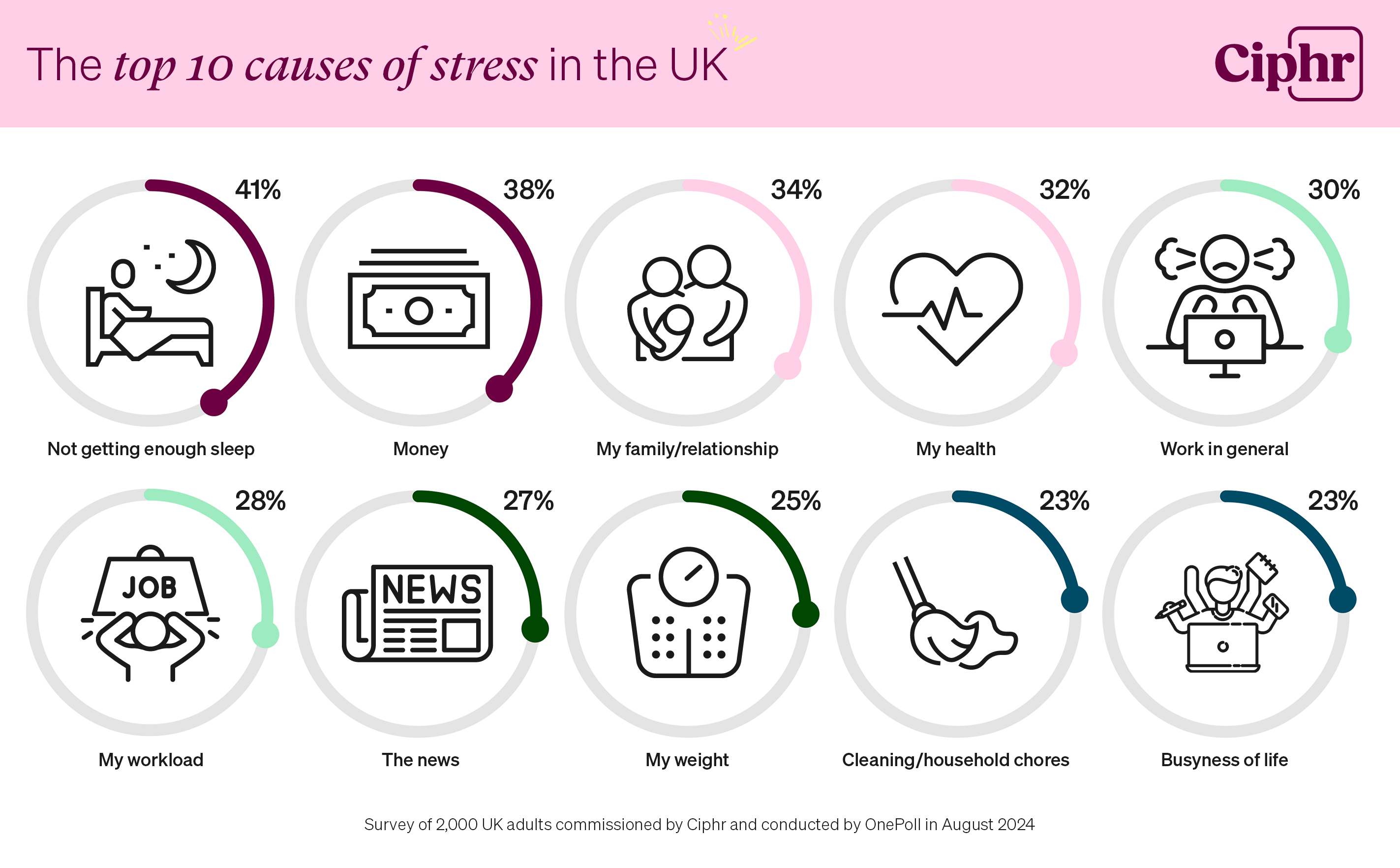The average adult spends 10 days a month feeling stressed, with tiredness, money, and ‘loved ones’ the leading causes of anxiety, according to a new report.
The survey of 2,000 UK adults, commissioned by HR software provider Ciphr, found that most (86%) people feel stressed at least once a month, and as many as one in nine (11%) experience stress every day.
While one in five (20%) men and one in 11 (9%) women describe themselves as being stress-free, for many others stress has a more constant, and, potentially, debilitating impact on their physical and emotional wellbeing.
Over half (60%) of those surveyed say they’re affected by stress for five days or more a month. And, of those, a quarter (24%) feel stressed more days a month than they don’t.
The survey results suggest that women generally feel stressed more often than men. They experience stress for 11.7 days a month, compared to men’s 8.7 days (with the average for all respondents at 10.3 days a month, or 123 days a year).
Women are also more likely to say they feel stressed every single day (14%, compared to 9% of men).
The people most likely to report experiencing stress daily are the unemployed. Nearly one in four (23%) say they’re stressed every day.
People with caring responsibilities are similarly affected – averaging 12 days a month feeling stressed. Notably, nearly one in six (18%) of those who support or look after their elderly, disabled or ill relatives, partners or friends get stressed daily. While one in eight (12%) parents say the same.
The least stressed group, in comparison, are those who have retired. Nearly half (45%) of retired men over 65 years old, and one in five (20%) retired women over 65 years old, say they never feel stressed in a typical month.
The findings form part of Ciphr’s comprehensive Workplace Stress Statistics in the UK report, examining the incidence and causes of stress (in and outside of work).
Common stressors
The top cause of stress, according to those polled, is not getting enough sleep or feeling tired. Sleep deprivation, and exhaustion, can perpetuate the stress cycle – where stress can impact sleep quality and quantity and increase feelings of tiredness, and lack of sleep and being tired can cause stress.
Feeling tired is the biggest stress trigger for all UK adults, cited by half (50%) of surveyed women and about a third (31%) of surveyed men (the average for all respondents is 41%).
Money (usually a lack of) is the second biggest cause of stress, affecting nearly two in five (38%) people in the UK.
Around one in three people attribute their stress to their family or relationship (34%), their health (32%), and work in general (30%).
Over one in four people find their workload (28%) stressful. A similar share of people also get stressed out by the news and what's going on in the world (27%), their weight (25%), cleaning and household chores (23%), and the busyness of life (having a busy schedule, 23%).
Other common stressors, for around a fifth of UK adults, include being lonely or feelings of loneliness (20%), Coronavirus (19%), caring responsibilities (19%), moving house (19%), their bosses at work (18%), not fitting in or feeling like they don’t belong (18%), and their friends and friendships (17%).
Daily activities that can also bring on feelings of stress and anxiety for some, include cooking and meal planning (a cause of stress for 16% of people), checking emails, instant messaging and taking part in group chats (14%), and social media (11%).
The top 10 causes of stress for UK adults
- Feeling tired / not getting enough sleep (41% of respondents)
- Money / my finances (38%)
- My family / relationship (34%)
- My health (32%)
- Work in general (30%)
- My workload (28%)
- The news / what’s going on in the world (27%)
- My weight (25%)
- Cleaning / household chores (23%)
- Busyness of life / busy schedule (23%)

The survey also found that certain causes of stress are more heightened for some generations than others.
People under-55 appear the most likely to worry about money and their finances (44% of 18-54 year olds vs 28% of the over-55s). And the leading stressors for older adults are feeling tired or not getting enough sleep (55-64 year olds) and concerns about their health (over-65s).
The people most likely to say that their family or relationship makes them feel stressed are 45-54 year olds (40%, compared to the survey average of 34%).
And work (in general) is the third biggest stressor for everyone aged 25 to 54 years old.
Stress in the workplace
Work plays a major role in most people’s lives, at some point or another. So, it’s perhaps unsurprising that work-related stressors feature so prominently in Ciphr’s research.
Nearly a third (30%) of UK adults say that their work in general raises their stress levels. Over a quarter (28%) say it’s their workload that gets them down, and around a fifth (18%) are impacted by long working hours and their bosses.
A further one in six people struggle with a poor workplace culture (16%), job security fears (16%), and stressful colleagues at work (15%).
Commuting is also still a bane for many (15%) people, despite the rise in remote and hybrid working since the Covid-19 pandemic.
Commenting on the findings, Claire Williams, chief people and operations officer at Ciphr, says: “It’s been three years since Ciphr last ran this survey, and, worryingly, we seem to be more stressed than ever.
“In 2021, 79% of UK adults said they felt stressed at least once a month. Now, that’s up to a staggering 86%. The number of people experiencing stress daily has also risen – from one in every 14 people to one in every nine people in the UK (from 7% to 11%).
“Work-related stress also appears to be impacting more people now. Unrealistic workloads and time pressures, overbearing bosses or toxic workplace cultures, can trigger high levels of unsustainable stress. This can interfere with people’s focus and productivity, and negatively affect our happiness at work, our job satisfaction, and, ultimately, our personal health and wellbeing.
“The last four years or so, with Covid and the ongoing cost of living crisis, have been incredibly challenging for many people. And everyone is likely to have been affected in different ways. Certain stressors are always going to be around, and there are many things outside of an employer’s control that can still take a toll on the workforce. But, it is vital that employers look out for the warning signs that individuals may be struggling and work proactively with them to help relieve those stresses, where possible. Ideally, before it becomes an overwhelming problem for the person themselves, and the wider business.”
Ciphr’s Workplace Stress Statistics are available to view at https://www.ciphr.com/infographics/workplace-stress-statistics. The study includes results from a Ciphr-commissioned survey of 2,000 nationally representative UK adults, conducted by OnePoll in August 2024.
Ciphr is the go-to HR software and solutions partner for medium and large organisations in the UK. Its integrated HR, payroll, learning and recruitment software, services and content provide invaluable insights to HR teams to inform their people strategy and grow and develop their organisations. Based in Reading, Ciphr is on a mission to amplify the voice and value of HR through intelligent people data solutions that help HR be heard – in the boardroom and across the business.
For more information, please visit www.ciphr.com.
###
Media enquiries:
Emma-Louise Jones, digital PR manager at Ciphr
e: ejones@ciphr.com
Chris Boddice, chief marketing officer at Ciphr
e: cboddice@ciphr.com
Website: www.ciphr.com
LinkedIn: www.linkedin.com/company/ciphr
Notes:
Infographic: Top 10 causes of stress in the UK 2024 (please credit and link to Ciphr.com): https://www.ciphr.com/hubfs/pr-charts/Top-10-causes-of-stress-in-the-UK-2024.png
Ciphr commissioned OnePoll to conduct an independent survey of 2,000 UK adults (nationally representative by age, gender and region). The survey ran between 31 July and 5 August 2024.
Survey data: https://www.ciphr.com/infographics/workplace-stress-statistics#survey-data-2024
Nearly two-thirds (62%) of respondents are currently employed, 5% are self-employed, 5% are unemployed, 3% are students, 4% are homemakers, and a fifth (21%) are retired. Nearly half (45%) of respondents report having some form of caring responsibilities (as a parent, guardian or carer etc).
Respondents were asked:
- On average, how many, if any, days of the month do you feel stressed?
- Which, if any, of the following has ever caused you to feel stressed? (none of the above and prefer not to say options were available)
The 2024 survey was an update to a similar survey that Ciphr commissioned in July 2021 (conducted by Censuswide to 2,000 nationally representative UK adults). In the 2021 survey, 23% of respondents said that work in general caused them stress and 18% cited workload as a stressor.
Ciphr is the go-to HR software and solutions partner for medium and large organisations in the UK. Its integrated HR, payroll, learning and recruitment software, services and content provide invaluable insights to HR teams to inform their people strategy and grow and develop their organisations. Ciphr is on a mission to amplify the voice and value of HR through intelligent people data solutions that help HR be heard – in the boardroom and across the business.
The Ciphr Group is a privately held company backed by ECI Partners and headquartered in Reading. Over 200 employees work across the group, which includes Ciphr, Shape Payroll, and Marshalls.
Ciphr spokespeople are available to provide expert media comment on a broad range of topics, including HR strategy, people management, employee experience and wellbeing, diversity, equity, and inclusion (DE&I), learning and development, the future of work, tech trends, business and leadership, marketing, and more.

HR managers share their go-to interview questions
Research by HR software provider Ciphr has revealed the interview questions that job hunters are most likely to be asked by UK HR managers.

New Google study reveals the most searched for interview questions
Job interviews can be daunting – especially if you’ve been caught out by a few tricky questions in the past. If you’ve ever searched online for tips...

Ciphr and ProAge launch survey on multigenerational working
HR software provider Ciphr and ProAge – a UK charity focused on age inclusion in the workplace – have teamed up to launch a new survey exploring the...
